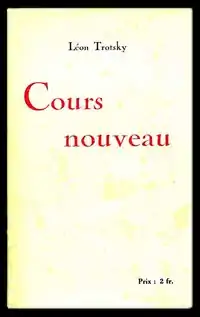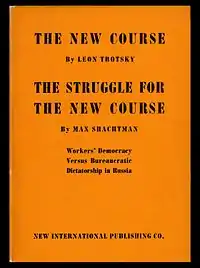New Course (Trotsky book)
The New Course (Russian: Новый курс) was a 1924 brochure by political leader Leon Trotsky. Frequently reprinted in various European and Asian language over subsequent decades, the tract is considered a first explicit statement of the Left Opposition within the ruling All-Union Communist Party (Bolsheviks) criticizing a trend towards bureaucracy and an attenuation of worker control over the political process.

.jpg.webp)
The book consisted of a collection of topical articles first published in the official Communist Party newspaper Pravda in December 1923 with additional material appended. The work was published in French and German translation as early as 1924 but did not appear in English until the fall of 1943.
History
Background
In the spring of 1921, with the Soviet Russia stricken by hyperinflation and factory shutdowns, its great cities depopulated and its economy on the verge of collapse, Soviet leader V. I. Lenin and the ruling Russian Communist Party (Bolsheviks) (RKP) launched a program of internal trade liberalization and monetary reform known as the New Economic Policy. This market-based retreat from the collectivist goals of the period of War Communism proved controversial among Communist Party members, with various interpretations of the deep meaning of the new program and schemes for a path forward to socialism in largely agrarian Russia gaining currency.
By 1923, the impact of these earlier reforms had begun to make itself felt through economic recovery. Moreover, by this date initial dreams of an immediate world revolution in the industrialized nations of Western Europe which would rescue the economy of economically backwards Russia had faded, indelibly colored by the failure of the 1923 Communist uprising in Germany in October of that year.[1]
Further complicating the situation was a growing power struggle in the governing Central Committee of the Communist Party, pitting a majority consisting of Grigory Zinoviev, Lev Kamenev, Joseph Stalin, and other long-time party members against a charismatic upstart who had only a few years earlier joined the RKP, Leon Trotsky. With Lenin ill from a series of strokes which began to fall him in 1923, these and other aspiring national leaders began to jockey for hegemony in the Bolshevik organization, attempting to make use of published economic and political analysis to demonstrate their own particular for the mantle of supreme leadership.
It was within this milieu that Trotsky published a series of articles in the official party daily newspaper, Pravda, in December 1923, sharply criticizing trends within the Communist Party towards bureaucratism — a critique which by extension was an appeal to the rank-and-file of the party organization for personal support vis-a-vis Zinoviev, Kamenev, Stalin, and other established party leaders.
Structure

The New Course includes three articles reprinted as chapters verbatim from the pages of Pravda, a fourth chapter being an outline of a report on “Bureaucratism and the Revolution,” and three additional chapters written especially for the new publication.[2] Also included by Trotsky in the book as appendices are a letter, two more December 1923 Pravda articles, and a short open letter signed by 8 young Communist Party activists.
There are in all a total of 7 short chapters, 3 chapter-length appendices, and a brief manifesto, with the count of pages of the Russian language first edition sitting at 104.[3] Page count of the same material in English translation is similar, running between 80 and 110 octavo pages depending upon the edition.[4]
Contents
- Chapter 1. The Question of Party Generations
- Chapter 2. The Social Composition of the Party
- Chapter 3. Groups and Factional Formations
- Chapter 4. Bureaucratism and the Revolution
- Chapter 5. Tradition and Revolutionary Policy
- Chapter 6. The "Underestimation" of the Peasantry
- Chapter 7. Planned Economy (Order No. 1042)
- Appendix 1. The New Course
- Appendix 2. Functionarism in the Army and Elsewhere
- Appendix 3. On the "Smytchka" Between Town and Country
- Appendix 4. Two Generations
First editions
The New Course has been translated and published in a variety of languages. First national editions[5] include the following:
| Country | Date | Translator | Comments |
|---|---|---|---|
| Soviet Union | January 1924 | not applicable | Published by the "Krasnaia nov'" publishing house in conjunction with Glavpolitprosvet. |
| France | 1924 | Boris Souvarine | |
| Germany | 1924 | ||
| Czechoslovakia | 1924 | ||
| Spain | 1928 | ||
| United States | September 1943 | Max Shachtman | Published under single covers with Shachtman's The Struggle for the New Course. |
| United Kingdom | October 1956 | ||
| Japan | November 1963 | ||
| China | 1965 | ||
| Italy | March 1967 | ||
| Sweden | May 1972 | ||
| Yugoslavia | 1972 | ||
See also
Footnotes
- Max Shachtman, "Introduction to the 1965 Edition," The New Course by Leon Trotsky and The Struggle for the New Course with a New Introduction by Max Shachtman. Ann Arbor, MI: University of Michigan Press, 1965; pg. 1.
- Leon Trotsky, "Preface" to The New Course in The New Course by Leon Trotsky and The Struggle for the New Course with a New Introduction by Max Shachtman. Ann Arbor, MI: University of Michigan Press, 1965; pg. 10.
- Leon Trotsky, "Novyĭ kurs," OCLC WorldCat no. 38808878.
- See: The New Course in The Challenge of the Left Opposition (1923-25), pp. 64-144; in The New Course by Leon Trotsky and The Struggle for the New Course with a New Introduction by Max Shachtman, pp. 7-118.
- Louis Sinclair, Trotsky: A Bibliography: Volume 1. In two volumes. Aldershot, England: Scholar Press, 1989; pg. 367.
Further reading
Primary sources
- The New Course by Leon Trotsky [with] The Struggle for the New Course by Max Shachtman. New York: New International Publishing Co., 1943.
- The New Course (1923). HTML version. David Walters, ed. Marxists Internet Archive, www.marxists.org/
- Naomi Allen (ed.), The Challenge of the Left Opposition (1923-25). New York: Pathfinder Press, 1975.
Secondary sources
- Isaac Deutscher, The Prophet Unarmed: Trotsky, 1921-1929. London: Oxford University Press, 1959.
- Baruch Knei-Paz, The Social and Political Thought of Leon Trotsky. Oxford, England: Oxford University Press, 1978.
- Moshe Lewin, Lenin's Last Struggle [1967]. A.M. Sheridan Smith, trans. New York: Pantheon Books, 1968.
- Valentina Vilkova, The Struggle for Power: Russia in 1923. Amherst, NY: Prometheus Books, 1996.
- Aleksandr Reznik, Trotskii i tovarischi: levaia oppozitsiia i politicheskaia kul'tura RKP(b), 1923–1924 gody. Sankt-Peterburg: Evropeiskii Universitet v Sankt-Peterburge, 2017. (in Russian)